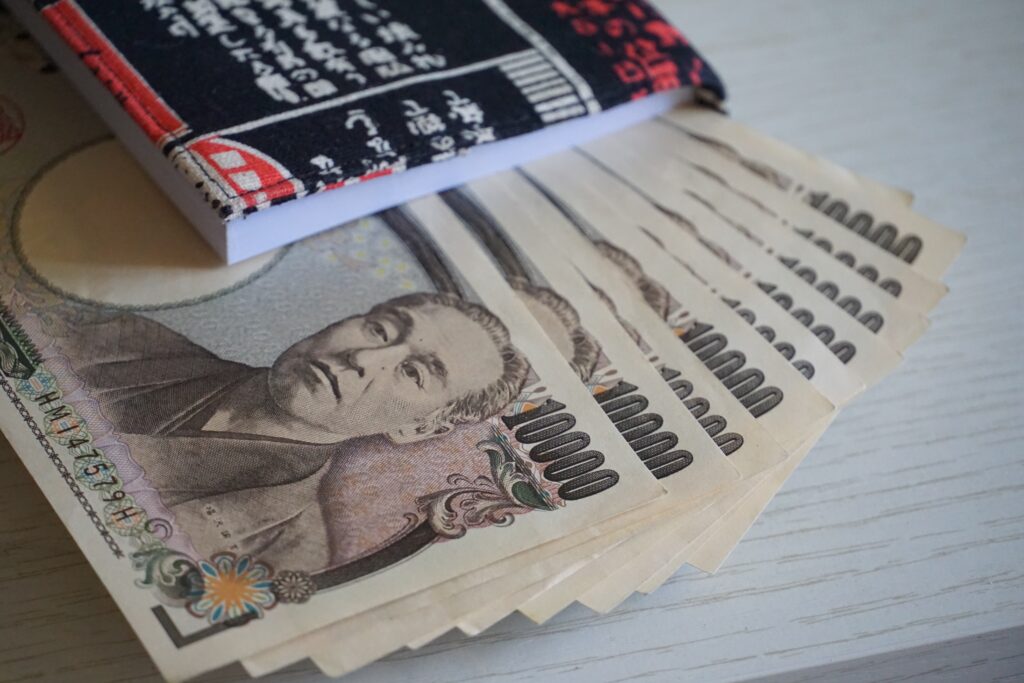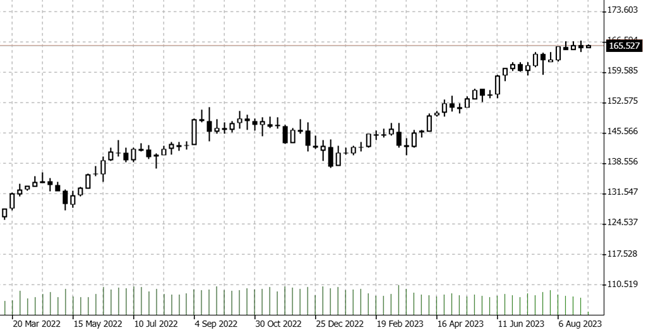

05.09.2023 – Intervention will come: The yen is too weak, eroding purchasing power. And the acceptance of the Japanese leadership. In the event that an expert is right with this thesis, traders should take a closer look at the foreign exchange.
We had already talked about Japanese monetary policy several times. Tokyo is the last central bank in the world to resist higher interest rates. This so that Japan bonds held by banks and insurers do not implode. The result is a fading yen. We could have shown you the euro, the dollar or the pound – everywhere it is the same picture with a few nuances. But today we have brought you the chart of CHFJPY in the weekly view.
Switzerland only has a key interest rate of 1.75 percent versus minus 0.1 percent in Japan. However, the Alpine republic is a haven of stability with a steely currency – which is due to the country’s exceptional “export products.” The discreet banking sector, luxury tourism in the Alps, watches or the pharmaceutical industry make Switzerland rich. So if the yen is to catch up, Japan will have to come up with something.

Source: Bernstein Bank GmbH
If Masaki Kondo of the Bloomberg news agency is right, a turnaround in Japanese monetary policy must indeed be in the offing at some point. Because the cheap money causes heavy collateral damage in politics. Everything becomes more expensive, Japan has to import many goods, and the budget shrinks. Kondo just judged, “Prime Minister Fumio Kishida’s falling popularity adds to the risk that the Bank of Japan may surprise investors again with a policy shift that will make voters happier.”
Politically dangerous
Political stress has been a factor in Bank of Japan intervention since late last year, he said. When the supported the yen last October, it was not only an intervention in the yen’s decline – but approval ratings for the Kishida administration had just tested new lows. It was the same, according to Kondo, with the first Yield Curve Control limit hike in December and the most recent YCC change in July.
The analyst hastened to point out the independence of the central bank. But: “Yet there is a clear line that connects the weak yen to inflation, and inflation to unhappy voters. When it comes to the timing of actions that can take some of the sting out of inflation, recent history indicates opinion polls are at least worth watching.”
The new central bank governor, Kazuo Ueda, also has national politics in mind, he said, as evidenced by his vote with the premier before the Jackson Hole meeting on Aug. 22. Of course, he said, Kishida also has problems outside monetary policy: for example, anger over a national ID card is growing, the low birth rate is a concern, and discussion is raging over radioactive effluent from Fukushima. However, the link from the weak yen to inflation is obvious. Therefore, it is wise to keep an eye on the opinion polls.
In our opinion, a renewed intervention in favor of the yen or a change in monetary policy are indeed options that traders and investors should keep an eye on. Bernstein Bank wishes good luck!
____________________________________________________________________________________________________________________________________________________________________
The content of this publication is for general information purposes only. In this context, it is neither an individual investment recommendation or advice nor an offer to purchase or sell securities or other financial products. The content in question and all the information contained therein do not in any way replace individual investor- or investment-oriented advice. No reliable forecast or indication for the future is possible with respect to any presentation or information on the present or past performance of the relevant underlying assets. All information and data presented in this publication are based on reliable sources. However, Bernstein Bank does not guarantee that the information and data contained in this publication is up-to-date, correct and complete. Securities traded on the financial markets are subject to price fluctuations. A contract for difference (CFD) is also a financial instrument with leverage effect. Against this backdrop, CFD trading involves a high risk up to the point of total loss and may not be suitable for all investors. Therefore, make sure that you have fully understood all the correlating risks. If necessary, ask for independent advice. CFDs are complex instruments and are associated with the high risk of losing money quickly because of the leverage effect. 68% of retail investor accounts lose money trading CFD with this provider. You should consider whether you understand how CFD work and whether you can afford to take the high risk of losing your money.7
